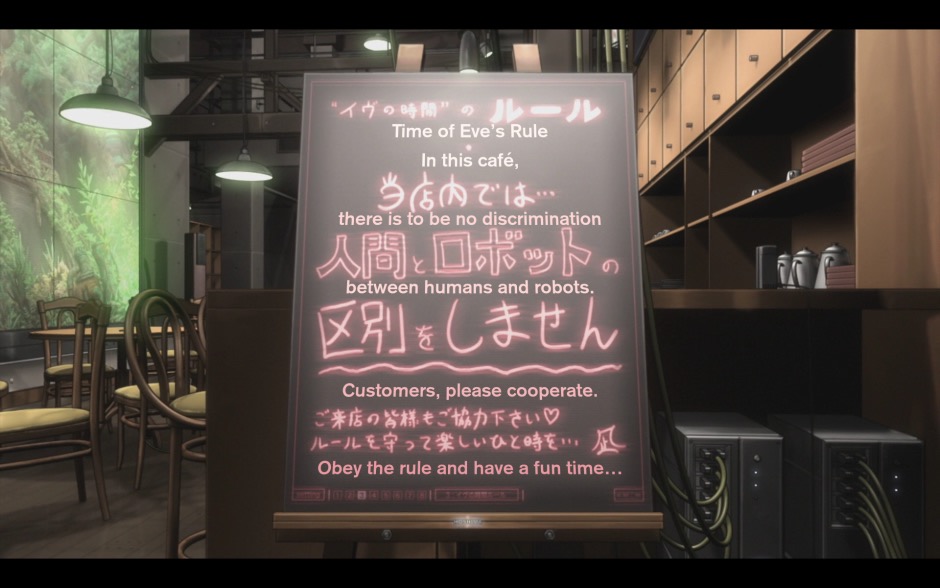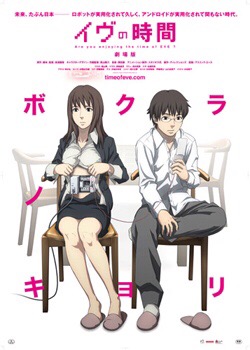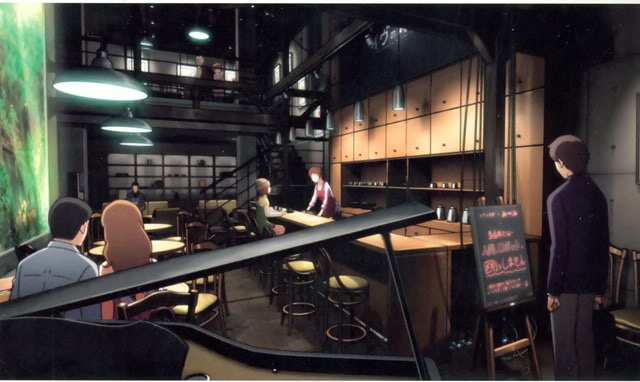Eve no Jikan, also referred to as Time of Eve is a film that was released in 2010. The film takes the stories from the original net animation and compiles them into a single movie.
In the world of Eve no Jikan, androids have become commonplace in every household. These androids look like perfect replicas of humans save for the fact that they can be monitored electronically. Despite their similarity to humans in form, they are regarded as lesser beings in society. Their low status has led to the androids being bound by what was coined as the Three Laws of Robotics. The first states that these androids cannot ignore possible harm to humans and cannot cause harm to humans themselves. The second law dictates obedience to human command save for instances that would violate the first law regarding harm to humans. The third and final law is that androids must preserve their well being save for situations that would go against either the first or the second of the Three Laws of Robotics. The film follows the android Sammy, whose owner, Rikuo discovers that she has been disobeying her protocol to visit a coffee shop called, Time of Eve.
The series creates a world that isn’t too far from our own with the rise of technology and the quickness of development. It explores the possibility of limited artificial intelligence and the implications of limiting reasoning and logic to a mere set of protocols. When an android deviates from the expected protocol and processes, does it make them more human? Is consciousness limited to human nature or are other beings capable of such functions? These concepts are thoroughly explored in the movie, particularly within the titular coffee shop, Time of Eve.

The Time of Eve coffee shop in itself serves as the most intriguing plot device of the short series turned film. Notable is the fact that while the plot line of androids living among humans has been used before, the presentation of it here through the setting of a coffee shop takes the plot line and gives it an intriguing twist. The peculiar aspect of the said coffee shop is that it manages to override a set of rules that have been established and heavily implemented by society. Within the confines of the coffee shop, androids and humans are regarded as being not only the same, but more importantly, equal. This is made apparent early on when the Rikuo discovers that androids who enter the coffee shop lose the defining or telltale marker that notifies all who can see that they are indeed not human. The disappearance of this marker while simple in the film, represents something greater – the eradication of stigmas and all basis for discrimination. The result is a place where all individuals regard each other as equals.
Time of Eve does a splendid job of challenging the world view of humans being superior and questioning, as other anime have done in the past, the basis of being human, albeit in quite a unique way.
The plot lines covered by the film are also quite interesting, told from the point of view of Rikuo who finds himself drawn to the cafe and sees himself returning repeatedly. He slowly learns about the regulars of the shop and sees what life could be like without the standard discrimination that he has grown accustomed to in his day to day life.

The film however feels quite difficult to label in terms of genre. While it does have the android aspect that makes it distinctly sci-fi, it lacks the futuristic feel that one would see in anime of the same genre. It’s more down to earth than it is futuristic adding to its charm. The best way to classify it would probably be to label it as a slice of life that has mixed in a number of philosophical elements. Time of Eve is a film that is best watched on a laid back rainy night.
